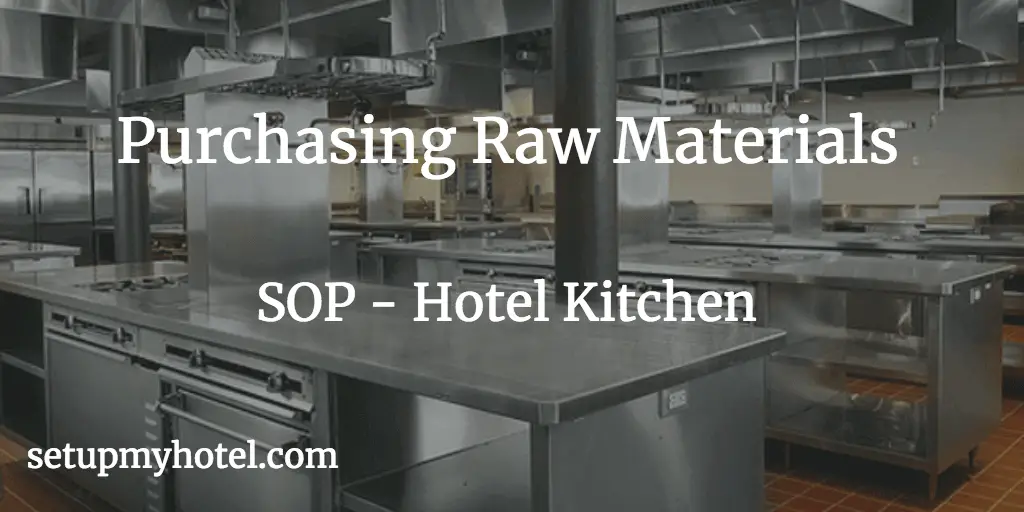Purchasing Food and Raw Materials in the Hotel Kitchen
When it comes to running a successful kitchen or food and beverage (F&B) production operation, one of the key areas to focus on is purchasing food and raw materials. This is where standard operating procedures (SOPs) come in.
An SOP is a set of step-by-step instructions that outline how to carry out a particular task or process. In the case of purchasing food and raw materials, an SOP can help ensure that the process is efficient, cost-effective, and meets quality standards.
Some key elements that might be included in an SOP for purchasing food and raw materials could include specifying the types and quantities of products needed, identifying potential suppliers, establishing procedures for placing orders and tracking deliveries, and outlining quality control measures such as inspections and testing.
Ultimately, having a well-crafted SOP for purchasing food and raw materials can help streamline operations and ensure that a kitchen or F&B production facility has the ingredients and supplies it needs to deliver high-quality products to customers.
All Raw Materials and processed food purchased for the kitchen operation should only be procured from approved vendors to assure the safety of food served to customers.
The Executive chef and HotelA Hotel or Inn may be defined as an establishment whose primary business is providing lodging facili... Purchase manager should be responsible for purchasing and receiving all goods systematically and ensuring a consistently high specification of product sources. The hotel management should develop and implement written product specifications to ensure products purchased consistently meet restaurant expectations.
Kitchen Purchasing Standard Procedures:
1) Ensure purchasing is carried out by authorized personnel:
- Roles and responsibilities within the purchasing function should be defined and communicated.
- Only authorized personnel should be entitled to select vendors and make any purchase orders.
- All purchases, where appropriate, are made based on agreed contracts only.
- Purchase specifications are used for all major goods purchased regularly.
- Weekly quotations are sought, where appropriate, to ensure that the best value is obtained.
- Minimum/maximum stock levels or par stocks should be maintained in the kitchen.
2) Purchase goods only from approved suppliers:
- Approved suppliers are selected following systematic evaluations to ensure that the best product quality and terms and conditions are achieved.
- The Food safety status of all suppliers is assessed periodically.
- Contracts are agreed upon with approved suppliers.
- Goods are only purchased from approved suppliers.
- Supplier performance is monitored regularly, corrective action is taken and relationships are evaluated annually.
3) Complete all purchasing activities in an efficient manner:
- The kitchen staff should adhere to predetermined purchase frequency.
- The Executive Chef or Sous Chef should use volume forecasting techniques to assist in estimating purchasing requirements.
- Purchase requisitionPurchase requisition is a form; usually prepared by a department head; requesting the purchasing dep... forms are used and written purchase orders are issued.
- All purchase requisitions should be entered into the Hotels Material Management System (MMS).
- Non-contract purchasing is supported by defined purchase specifications and is only conducted by experienced and competent personnel.
- For Non-contract purchasing, price quotations should be always sought in advance.
4) Standard For Purchasing of Pasteurized Dairy Products:
- Visit approved vendors to ensure that they maintain clean warehouses and adhere to safe storage and handling practices.
- Observe the delivery vehicles to ensure that they are clean and temperatures are properly controlled.
- It’s a good practice to request a photo ID badge of the delivery person when you don’t trust is or have complaints.
- Use written product specifications to ensure that the vendor knows what is to be delivered.
5) Tips for the employees who are responsible for purchasing food must:
- The staff is knowledgeable to understand the regulations for specific foods.
- Coordinate delivery times with vendors/suppliers to ensure that deliveries are made when they can be stored immediately.
- ScheduleA schedule is a report which gives supporting details to a property's financial statements. receiving times when product quantity and quality can be checked, including product temperatures.
- Review orders and delivery information to ensure orders and product specifications are being met.
- When making direct purchases, buyers should ensure packages are clean and will maintain the integrity of the food item, as communicated through product specifications.
- Meat and fresh shell eggs may be purchased from local licensed producers, but because these foods are considered potentially hazardous, the products must be inspected for safety regularly.
- Meat and fish packages should always contain an inspected/checked package.
Training Summary questions:
Q1. What is the purpose of this SOP?
Q2. Who is responsible to check and monitor purchasing activities in the kitchen?
Q3. Explain why it is important to purchase items from approved vendors.
Q4. What is the standard for purchasing dairy products in the kitchen?
Q5. Why is this an important tip for the employees who are responsible for purchasing?
Patreon Only SOP Download
SOP Number: Kitchen / F&B Production SOP – 6 Department: Kitchen / Food Production - Raw Material and Food Purchasing Date Issued: 18-Sep-2018 Time to Train: 30 Minutes












